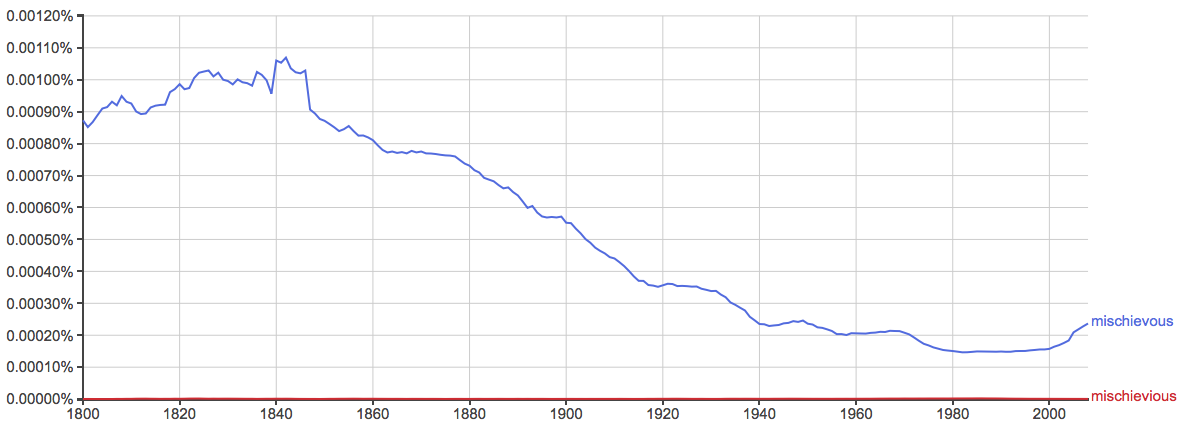Some people are always causing trouble. Sometimes, the person might just be accident-prone. We might call such a person clumsy or hapless.
Other people, though, seem to relish trouble, and seek it out at every turn. Rather than hapless and clumsy, we might call these people devious or mischievous.
Should mischievous and devious rhyme? The way some people pronounce mischievous, it would appear so. Even some writers alter the spelling of the word, writing mischievious instead.
Many English words have more than one accepted spelling, but is mischievous one of them? Continue reading to find out.
How Do You Spell Mischievous?
In this post, I will compare mischievous vs mischievious. I will use each of these words in at least one example sentence, so you can see them in context. Plus, I will show you a helpful memory tool that will make choosing mischievious or mischievous a little easier.
When to Use Mischievous
 What does mischievous mean? Mischievous is an adjective that means looking for trouble.
What does mischievous mean? Mischievous is an adjective that means looking for trouble.
To put it simply, mischievous means full of mischief, where mischief is a noun referring to lighthearted trouble.
Children are often mischievous, and it is easy to think of a joyful puppy who is constantly making messes as mischievous, as well.
Here are a few more example sentences:
- “Young Mr. Potter and his new friends have become quite mischievous,” said the grouchy professor.
- Mischievous interns always find a way to give me a headache when they have too much free time.
- This week, a mischievous freshman on the team, who goes by the nickname of Rascal, poses a couple of perplexing puzzles to his teammates. –The Wall Street Journal
As noted, mischievous is related to the noun mischief. Its adverb form is mischievously. Mischief doesn’t have a verb form; most writers would use making mischief or causing mischief in these instances.
How to Pronounce Mischievous
 Mischievous pronunciation: Mischievous is pronounced as three syllables: mis-chuh-ves.
Mischievous pronunciation: Mischievous is pronounced as three syllables: mis-chuh-ves.
The error is to pronounce mischievous as four syllables (more on that below).
When to Use Mischievious
What does mischievious mean? Mischievious is a misspelling of mischievous.
Many speakers also pronounce the word with four syllables, like mis-CHEE-vi-ous (so that it rhymes with previous). It’s unclear whether the misspelling or the mispronunciation came first, or if they developed together.
Mischievious rarely appears in edited prose. As you can see from the below graph, which charts mischievious vs. mischievous across books written since 1800, mischievous greatly outnumbers mischievious in edited words.

Mischievious has barely registered a blip over the last 200 years of use. The disparity is in excess of 380:1 in favor of mischievous.
This chart obviously doesn’t deal with pronunciation, but the reason mischievous is sometime mispronounced is because it is spelled wrong.
Trick to Remember the Difference
As a skillful writer, you should only use mischievous, especially in formal writing. Mischievious is widely rejected in writing, though common in spoken English.
Mischievious has an extra I, like incorrect, so you should find it easy to remember that mischievious is incorrect.
Summary
Is it mischievous or mischievious? Mischievous, an adjective, means having an affinity for causing trouble. Some writers are prone to spelling the word mischevious, which is how some speakers mistakenly pronounce the word aloud.
In summary,
- Mischievous is correct.
- Mischievious is a spelling error.
Contents
